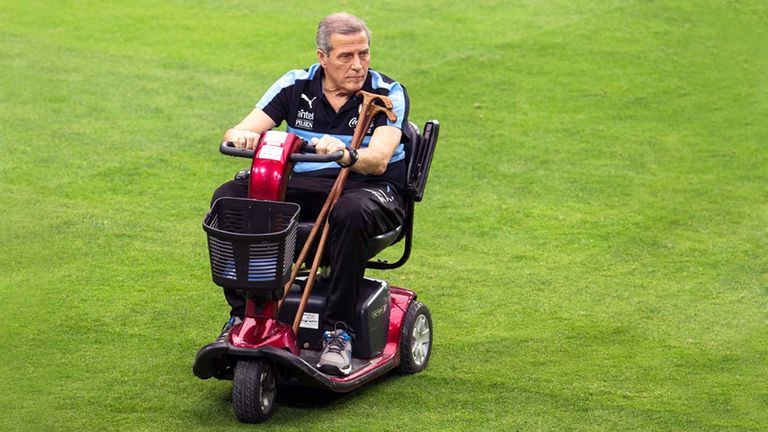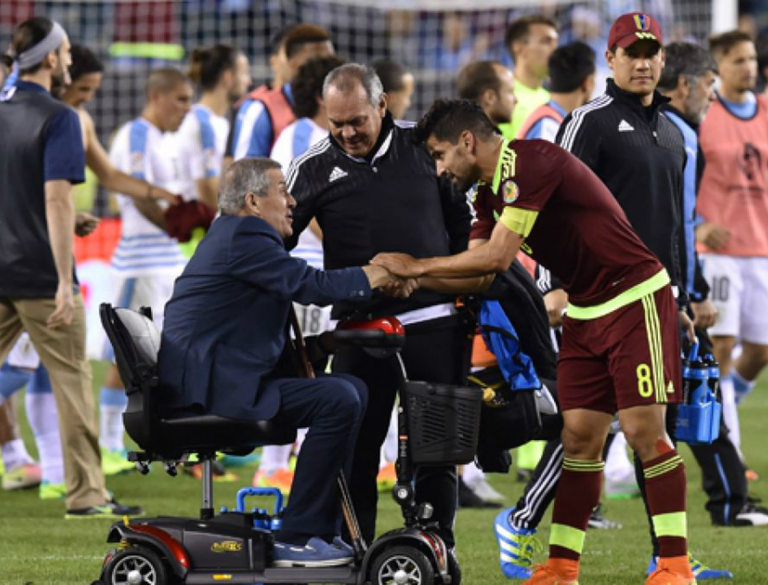
In his youth he worked as a teacher and since then the nickname stuck with him. He was a brave central defender. As a coach he marked an era. He was a champion with Boca and Peñarol. In the 2018 World Cup he built a new Uruguayan miracle. Then health conditions and uncertain results in the South American qualifying stage forced him to abdicate in favor of Aguirre, his successor.
At Eduardo Galeano's house in the Malvín neighborhood of Montevideo, hanging on the dark green painted iron railings, there is a sign reading "Closed for football." There, next to his wife Helena, among books and crafts, the Uruguayan writer is amazed and excited: La Celeste is working magic and miracles in the World Cup in South Africa and is in the semi-finals, contrary to the predictions made during the rigors of the qualifiers against Costa Rica. There are only a few days left until the match against Holland. Galeano wrote then: "I hope that today the goddess of the wind will kiss our feet again so that, regardless of the results, we will keep our honor high."
Uruguay did just that. Even though they lost, they held their honour high. And there, in the middle of the sad scene but without reproach, was the father of the new Uruguayan miracle in the World Cups: Oscar Washington Tabárez, that Master. He is the owner of all the victories of La Celeste in the last forty years of World Cups. And he also built the best campaign since that memorable Maracanazo, that black and white epic that took place more than six decades ago. From there, the big names (like Roque Máspoli, goalkeeper of that team captained by Obdulio Varela, who managed to silence that monster of 200,000 heads), successful coaches in their clubs (like Jorge Fosatti) and outstanding foreigners (like Daniel Passarella) passed through the ranks. No one ever achieved as much as Tabárez,
Thus, Tabárez has put together a team in his own image and likeness. Without nonsense, without false promises, with the Uruguayan spirit that history tells, with the contribution of valuable players (like Diego Forlán, chosen as the best player in South Africa 2010). Because the coach knows it and says it with conviction: “You can't make a great team without great players. And we have the opportunity to count on that type of players.” Uruguay was in its last epic episode and also now, in the run-up to the Copa América, a reasonable team. Like Tabárez when it comes to words, who tells the truth without sugarcoating it. Perhaps he learned it in his days as a teacher, when the nickname that still accompanies and defines him was born. It was a time when his passion for football shared space with his other pursuit: teaching, as he did in three schools in the Cerro,
Beyond his way of seeing football, Tabárez is an outstanding team leader. Those who know him in detail, his players, know it. And the managers, who have to work hard to be up to par, know it. It is worth mentioning an anecdote: during the World Cup, Sebastián Abreu asked him to kick the last penalty in the quarter-final series against Ghana. The coach, even knowing that El Loco could do something crazy - kick it Panenka style - let him. He trusted him. He gave him the responsibility. The result was this new miracle for La Celeste. That detail happened in the only way possible in recent history: with El Maestro giving a driving lesson.
As a child – a botija, in Uruguayan terms – he had played forward. But he soon became a central defender. As history written in sky blue dictates: brave, intense. He played in minor teams: La Fraternidad, Sudamérica, Sportivo Italiano, Wanderers, Fénix, Bella Vista. During the course of his sporting life, he also walked through underprivileged areas, of hard-working people, teaching in classrooms where nothing was superfluous. The schools where he taught were close to his home and, above all, close to his concerns. They were not easy times, with large contracts. He once told the newspaper Olé: "I finished as a footballer without having saved anything. I played in many small clubs. I had enough to buy a small house."
After his retirement as a footballer, he began his long and valuable career in that profession that took him all over the world. The new occupation forced him to move away from teaching in the classroom. "I had to leave the schools. I was on unpaid leave," he says every time he is asked about those days. He started at Bella Vista, with the youth teams. He continued with the Uruguay U-20 team. Then, after coaching Danubio and Wandereres, he helped Peñarol win the 1987 Copa Libertadores. People were already talking about him, that man with little to say and a lot to say. He was at Deportivo Cali, he took La Celeste to the 1990 World Cup in Italy; he took Boca to the championship after eleven years. Then he came to Europe: Cagliari, Milan, Oviedo. Then he returned to Argentina: he coached Vélez and was runner-up with Boca in 2002.
Now, legitimised by his achievements and his work and driven by popular acclaim, he will also lead Uruguay in the Copa América. It will be his third participation in the continental tournament: he was runner-up in 1989, in Brazil, and fourth in the last edition, Venezuela 2007. He will face the challenge as he always does, putting himself in the background although he will be at the centre of the scene. He says now as he has always said: "A coach must have the virtue of taking advantage of his resources, but he does not play." And so Uruguay will arrive, with its Maestro at the helm. In the name of more glory.

En su juventud se desempeñó como maestro y desde entonces se le quedó pegado el apodo. Fue un valiente marcador central. Como técnico marcó una época. Fue campeón con Boca y con Peñarol. En el Mundial 2018 construyó un nuevo milagro uruguayo. Entonces las condiciones de salud y los resultados inciertos en la etapa eliminatoria sudamericana lo obligaron a abdicar en favor de Aguirre, su sucesor.
En la casa de Eduardo Galeano, en el barrio Malvín de Montevideo, colgado sobre las rejas de hierro pintadas de verde oscuro, hay un cartel con un cartel: "Cerrado por fútbol". Allí, junto a su esposa Helena, entre libros y artesanías, el escritor uruguayo está asombrado y entusiasmado: La Celeste hace magia y milagros en el Mundial de Sudáfrica y está en semifinales, contrariamente a los pronósticos hechos durante los rigores de la eliminatorias contra Costa Rica. Faltan pocos días para el partido contra Holanda. Galeano escribió entonces: “Espero que hoy la diosa del viento vuelva a besarnos los pies para que, independientemente de los resultados, mantengamos en alto nuestro honor”.
Uruguay hizo precisamente eso. Aunque perdieron, dejaron en alto su honor. Y ahí, en medio de la triste escena pero sin reproches, estaba el padre del nuevo milagro uruguayo en las Copas del Mundo: Oscar Washington Tabárez, ese Maestro. Es el dueño de todas las victorias de La Celeste en los últimos cuarenta años de mundiales. Y también construyó la mejor campaña desde aquel memorable Maracanazo, aquella epopeya en blanco y negro que tuvo lugar hace más de seis décadas. De ahí, los grandes nombres (como Roque Máspoli, portero de aquel equipo capitaneado por Obdulio Varela, que supo dejar en silencio a aquel monstruo de 200.000 cabezas), entrenadores de éxito en sus clubes (como Jorge Fosatti) y extranjeros destacados ( como Daniel Passarella) pasaron por las filas. Ninguno en ningún momento logró tanto como Tabárez,
Así, Tabárez ha montado un equipo a su imagen y semejanza. Sin tonterías, sin falsas promesas, con la garra charrúa que cuenta la historia, con la aportación de jugadores valiosos (como Diego Forlán, elegido mejor jugador de Sudáfrica 2010). Porque el entrenador lo sabe y lo dice con convicción: “No se puede hacer un gran equipo sin grandes jugadores. Y tenemos la oportunidad de contar con ese tipo de jugadores”. Uruguay estaba en su último episodio épico y también ahora, en la antesala de la Copa América, un equipo razonable. Como Tabárez a la hora de las palabras, que cuenta realidades sin maquillar. Tal vez lo aprendió en sus días de maestro, cuando nació el apodo que aún lo acompaña y lo define. Fue una época en que su pasión por el fútbol compartió espacio con su otra búsqueda: la docencia, como lo hizo en tres colegios del Cerro,
Más allá de su forma de ver el fútbol, Tabárez es un destacado líder de equipo. Los que le conocen al detalle, sus jugadores, lo saben. Y los directivos, que tienen que esforzarse para estar a la altura, lo saben. Vale la pena mencionar una anécdota: durante la Copa del Mundo, Sebastián Abreu le pidió que pateara el último penal en la serie de cuartos de final contra Ghana. El entrenador, aún sabiendo que El Loco podía hacer alguna locura -patearla al estilo Panenka-, lo dejó. Él confiaba en él. Él le dio la responsabilidad. El resultado fue este nuevo milagro para La Celeste. Ese detalle ocurrió de la única forma posible en la historia reciente: con El Maestro dando una lección de manejo.
De chico -de botija, en términos uruguayos- había jugado de delantero. Pero pronto se convirtió en un marcador central. Como manda la historia escrita en azul cielo: valiente, intensa. Jugó en equipos menores: La Fraternidad, Sudamérica, Sportivo Italiano, Wanderers, Fénix, Bella Vista. En el transcurso de esa vida deportiva, también caminó por zonas desfavorecidas, de gente trabajadora, enseñando en aulas donde nada estaba de más. Las escuelas donde enseñaba estaban cerca de su casa y, sobre todo, cerca de sus inquietudes. No eran tiempos fáciles, con grandes contratos. Una vez le dijo al diario Olé: "Terminé como futbolista sin haber ahorrado nada. Jugué en muchos clubes pequeños. Me alcanzó para comprar una casita".
Luego de su retiro como futbolista, inició su larga y valiosa carrera en ese oficio que lo llevó por todo el mundo. La nueva ocupación lo obligó a alejarse de la enseñanza en el aula. “Tuve que dejar los colegios. Estaba de baja sin goce de sueldo”, dice cada vez que le preguntan por esos días. Empezó en Bella Vista, con los equipos juveniles. Continuó con la selección de Uruguay Sub-20. Luego, tras entrenar a Danubio y Wandereres, ayudó a Peñarol a ganar la Copa Libertadores de 1987. Ya se hablaba de él, ese hombre de poco que decir y mucho hrkr5ZneTvQlacer. Estuvo en Deportivo Cali, llevó a La Celeste al Mundial de Italia 1990; llevó a Boca al campeonato después de once años. Luego vino a Europa: Cagliari, Milán, Oviedo. Luego regresó a Argentina: entrenó a Vélez y fue subcampeón con Boca en 2002.
Ahora, legitimado por sus logros y su trabajo e impulsado por el clamor popular, también dirigirá a Uruguay en la Copa América. Será su tercera participación en el torneo continental: fue subcampeón en 1989, en Brasil, y cuarto en la última edición, Venezuela 2007. Enfrentará el desafío como siempre lo hace, poniéndose en un segundo plano aunque estará en el centro de la escena. Dice ahora como siempre ha dicho: "Un entrenador debe tener la virtud de aprovechar sus recursos, pero no juega". Y así llegará Uruguay, con su Maestro al mando. En nombre de más gloria.
Espero que esta publicación te haya gustado. Si tienes alguna duda, consulta o quieras complementar este post, no dudes en escribir en la zona de comentarios.




Sources consulted (my property) for the preparation of this article. Some paragraphs may be reproduced textually.
Fuentes consultadas (de mi propiedad) para la elaboración del presente artículo. Algunos párrafos pueden estar reproducidos textualmente.
| Argentina Discovery. |  |
|---|---|
| Galería Fotográfica de Argentina. |  |
| Viaggio in Argentina. |  |